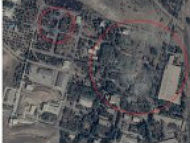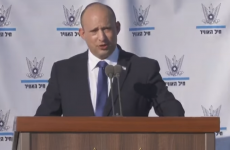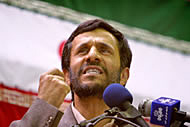
The satellite photos are shocking – the mysterious explosion flattened many buildings inside Iran’s Parchin military test site. Now under international pressure to reach a nuclear accord with the 5P+1, the timing of the blast was atrocious for Tehran. It again raises the specter of an Iranian nuclear weapon in the making. So far the Iranian negotiators have continued to stonewall with their diplomatic waltz of one step forward and two steps back. It appears that Ayatollah Khamenei and the fanatic Revolutionary Guards, who call the shots, are ready to make some marginal concessions in return for easing the crippling economic sanctions. However, they have dug in their heels on maintaining the potential to develop A-bombs in the future. Say, after the Iranian economy has recovered. So what went wrong in Parchin on October 7th that sent ‘shock waves’ not only through Tehran but also across the world?
The Iranians are anything but stupid – they would never have risked such a calamity, so it was certainly not an accident.
It is reasonable to assume that Iranian scientists would not have planned a massive explosion at a time that President Hassan Rouhani and Foreign Minister Javad Zarif are in the midst of their charm campaign to dupe the West into believing they represent the face of a new and peace-loving Iran. With the November deadline fast approaching and nothing really to show for it, the last thing the regime needed was a huge explosion that would raise fresh questions about why the Iranians have categorically rejected IAEA requests to inspect the Parchin facility. The Iranians are anything but stupid – they would never have risked such a calamity, so it was certainly not an accident. After the possibilities of planned test or an accident are not probable, what remains is foreign sabotage. Cui bono?
…would the Obama administration now risk arousing Iranian ire by sabotaging Parchin? This is highly unlikely. So what remains is Israel.
In the past, it’s been assumed that the U.S. and Israel had a devious hand in sabotaging Iran’s nuclear program, but at present President Barack Obama is trying to persuade the Iranians to join his coalition to fight the ‘Islamic State’. If so, would the Obama administration now risk arousing Iranian ire by sabotaging Parchin? This is highly unlikely. So what remains is Israel. It is noteworthy that on Sept. 24th, Strategic Affairs Minister Yuval Steinitz stated that Israel had ‘highly reliable information’ that Iran had conducted nuclear weapons experiments at Parchin. Steinitz referred to technology that had the sole purpose of detonating a nuclear weapon:
“It is important to stress that these kinds of tests can have no ‘dual use’ explanation- since the only possible purpose of such internal neutron sources is to ignite the nuclear chain reaction in nuclear weapons”.
The plot thickens. The Kuwaiti newspaper al Rai has reported that Iran blamed Israel and retaliated by ordering Hezbollah, its Lebanese proxy, to attack Israeli forces on the northern frontier. On October 7th, Hezbollah detonated two IEDs inside Israeli territory in the Har Dov region that lightly wounded two soldiers.
Iran blamed Israel and retaliated by ordering Hezbollah…to attack Israeli forces on the northern frontier.
But was the Parchin explosion loud enough to wake up Western leaders to the Iranians’ double talk? That remains to be seen. At present the focus is on doing what it takes to cope with the Islamic State and, despite Secretary of State Kerry’s denials, a nuclear deal with Tehran in return for joining President Barack Obama’s coalition forces could be on the cards.
John Kerry is back…
The unflagging Secretary of State has offered to launch a new Israeli-Palestinian peace mission after his previous proposals fell through last April. A State Department official in Washington has disclosed:
“More broadly, we are interested in sort of breaking the cycle we have been in, in the last six years of war (between Gaza & Israel) and reconstruction there (Gaza)”.
Kerry will announce America’s ‘willingness to re-engage in the negotiations and facilitate successful negotiations’ when he flies to Cairo for a conference with thirty of his counter-parts who convene to discuss raising $1.4 billion dollars to rebuild Gaza after the recent 50-day war with Israel.
…the current truce between Hamas and Israel might extend over a considerable period of time.
Consider this: Israel has acquiesced in Palestinian President Mahmoud Abbas’ decision to send his representative to Cairo to confer with his Hamas partners in the National Unity government. Abbas clashed bitterly with Hamas over its rocketing Israel, and now Hamas has been forced to accept Abbas control of border terminals that are vital for transporting materiel into Gaza for the reconstruction. This massive project is expected to take several years, and during that time it is inconceivable that Hamas would disrupt it by again provoking Israel with fresh rocketing attacks. If this is true, the current truce between Hamas and Israel might extend over a considerable period of time. If indeed Hamas is forced to swallow the bitter pill and also call off terrorism on the West Bank that triggered the recent conflagration, then it could open a window of opportunity for a new round of negotiations.
But with this proviso: the major reason Kerry and his point man, Martin Indyk, failed in their mission was they felt they could sit down at their diplomatic drawing board and present all the answers at one go for solving the most intractable conflict on the globe. This at a time the Middle East was unraveling at the seams and Islamic fanaticism was on the ascendancy. And what was Obama’s job rating amid this turmoil? Obama’s former defense secretaries Robert Gates and Leon Panetta have castigated Obama, blaming him for poor judgment in Iraq and Syria.
Panetta portrayed Obama as a President who “relies on the logic of a law professor rather than the passion of a leader”.
Throughout the region America’s allies also think the President has misread the Arab Spring by even preferring the Muslim Brotherhood in Egypt! Panetta portrayed Obama as a President who “relies on the logic of a law professor rather than the passion of a leader”. Case in point: look at Obama’s waffling over what to do about saving the Kurdish town of Kobani, which is threatened now by another Islamic State massacre. America’s recent record in the region has aroused questions of credibility in most Middle East capitals including Jerusalem.
However Indyk, although acknowledging the immediate threats to Israel posed by Hamas, Hezbollah and the West Bank (not to mention IS and Iran), chose to blithely dismiss them in his recent interview with Foreign Policy magazine:
“There are security answers to all of that.”
Security answers like those in Iraq for example? And while Indyk was right to take umbrage with Israel’s Defense Minister Moshe Yaalon for reacting undiplomatically to the Kerry security proposals, Indyk himself also replied like a law professor:
“…The fact is the U.S. approach was doomed from the start. It’s impossible to resolve all the issues in one fell swoop…”
‘There’s a sense that Israel has become a power in its own right, and it doesn’t need the United States as much. It’s a kind of hubris’.
Even Super dove Dr. Yossi Beilin was shocked:
“I’ve known and respected Martin Indyk for years, but this time I’m really mad at him. The fact is the U.S. approach was doomed from the start. It’s impossible to resolve all the issues in one fell swoop. What’s needed is a step-by-step approach to overcome the huge credibility gap.”
This step-by-step assessment may indeed be the best way forward for a new Kerry mission.
“If a member of Congress is using the Brookings Institution reports, they should be aware they are not getting the full story.”
P.S. Martin Indyk now serves as Vice president and director of the Foreign Policy Program at the Brookings Institution in Washington, which the New York Times has exposed as one of the American think tanks that has been taking confidential donations from foreign governments. Last year, Brookings was said to have received a $14.8 million donation from Qatar, the Persian Gulf State that argues that Muslim Brotherhood-style political Islam is the Arab world’s best hope for democracy. (Maybe that’s why Obama was persuaded to support it in Cairo!) So how much credence should be given to Brookings experts like Indyk if they are, so to speak, on Qatar’s payroll?
Saleem Ali, who served as a visiting fellow at the Brookings Doha Center in Qatar, said he had been told during his job interview that he could not take positions critical of the Qatar government in papers:
“If a member of Congress is using the Brookings Institution reports, they should be aware they are not getting the full story.”




